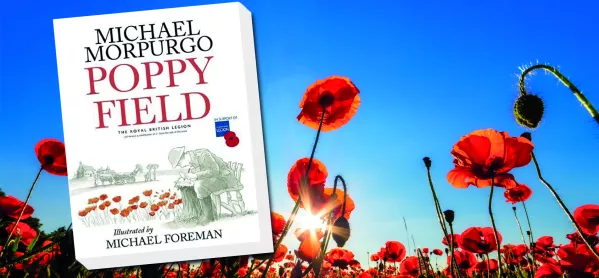The class book review: Poppy Field
Share
The class book review: Poppy Field
Poppy Field
Author: Michael Morpurgo
Publisher: Scholastic
Details: 80pp, £12.99, hardback
ISBN: 9781407181424
Teacher review
This beautiful and poignant book is perfectly timed to commemorate the 100th anniversary of the end of the First World War. Written in support of the Royal British Legion, it links the events of 100 years ago with today, through the story of Martens’ family, who have lived in Flanders for generations.
Like all children, Martens loves to hear the stories of his childhood and those of his parents, grandparents and great-grandparents. His family’s story takes the reader back through the generations to the time of the First World War, and brings to life the poem In Flanders Fields, as well as the importance of the humble poppy.
It is a simple tale of rural life set against the horror of war. The book cleverly intertwines a plot in which John McCrae’s poem becomes important to a single family and then adopted as a central part of remembrance services. The chronology of the generations will need further explanation for primary-aged children, but the story of everyday life that each generation brings to the tale is one that all in key stage 2 and above can enjoy.
The symbol of the poppy is central throughout the story and is further enhanced by Michael Foreman’s exquisite illustrations.
This is not just a storybook. It also includes a full copy of In Flanders Fields and a report about the symbolic poppy. It explains the determination of two women to have the poppy adopted as an emblem of remembrance in the US and United Kingdom. These true events are accompanied by fascinating details and photographs that will appeal to all. The report ensures children understand the reasons why some people choose to wear the poppy, and how this choice and freedom is something for which we should all be thankful.
As my own great-grandfather died in 1920 from injuries sustained in the First World War, it is a part of history with which I have always felt a personal connection. But, as these family links become ever more distant, books such as this will help to keep the history alive for younger people.
Whether read for the enjoyment of a good story or to increase knowledge of a historical period, Poppy Field is a beautiful reminder of how thankful we should be for the bravery and sacrifice of previous generations.
Andrea Donnelly is a deputy headteacher and English leader at Hollymount School in Worcester
Pupils reviews
Great for education and entertainment
Poppy Field is one of Michael Morpurgo’s finest books. This book is about a boy called Martens and his grandfather. The grandfather tells a 7-in-1 story about their ancestors in World War 1. This book is great for education, facts and entertainment. Also, I love the way Michael uses language - it feels like you are there in the moment. Poppy Field is a great book and what makes it better is it is in support of the Royal British Legion. I give it 10/10.
Lucy, aged 10
This book is about a little boy’s grandfather telling him a story about his grandma. When she was a little girl, Marie sold eggs with a free poppy. One day she came across a soldier who was trying to write a poem for his dead friend. While he was trying to get his poem right, he threw a scrap of paper onto a nearby lake. Marie picked it up and put it in her pocket. When she got home, she remembered about the poem and showed it to her family. From then on, they trust the poem’s words to keep them safe. I would recommend this book to people who love to read and people who want to learn about the history of the poppy. I give it 5/5.
Muskarn, aged 10
This is an incredible book to teach anyone about World War 1. It contains a poem by John McCrae, a family’s story and some beautiful illustrations by Michael Foreman. Would I recommend this book? Yes, of course, as this a very descriptive piece of work and even tells us more about the start of poppies and how they became popular.
Lauren, aged 10
I think this book is good. It’s interesting and it gives you some facts. It’s not too long or short. Even though it can get a little confusing, it is still enjoyable to read. At some parts it is a bit sad, but overall I liked it
Kayla, aged 10
You can support us by clicking the title link: we may earn a commission from Amazon on any purchase you make, at no extra cost to you
If you or your class would like to write a review, please contact kate.parker@tes.com

